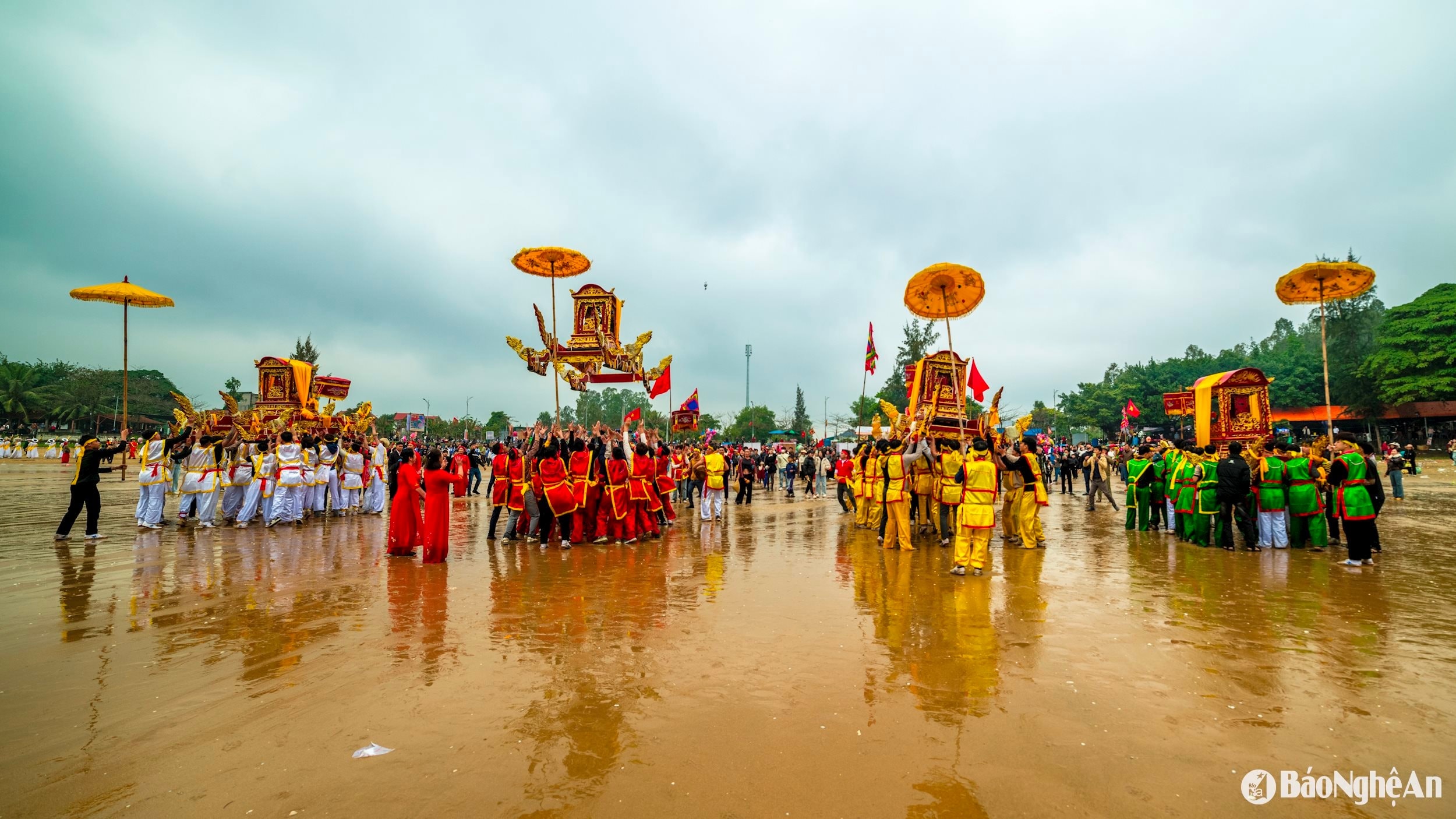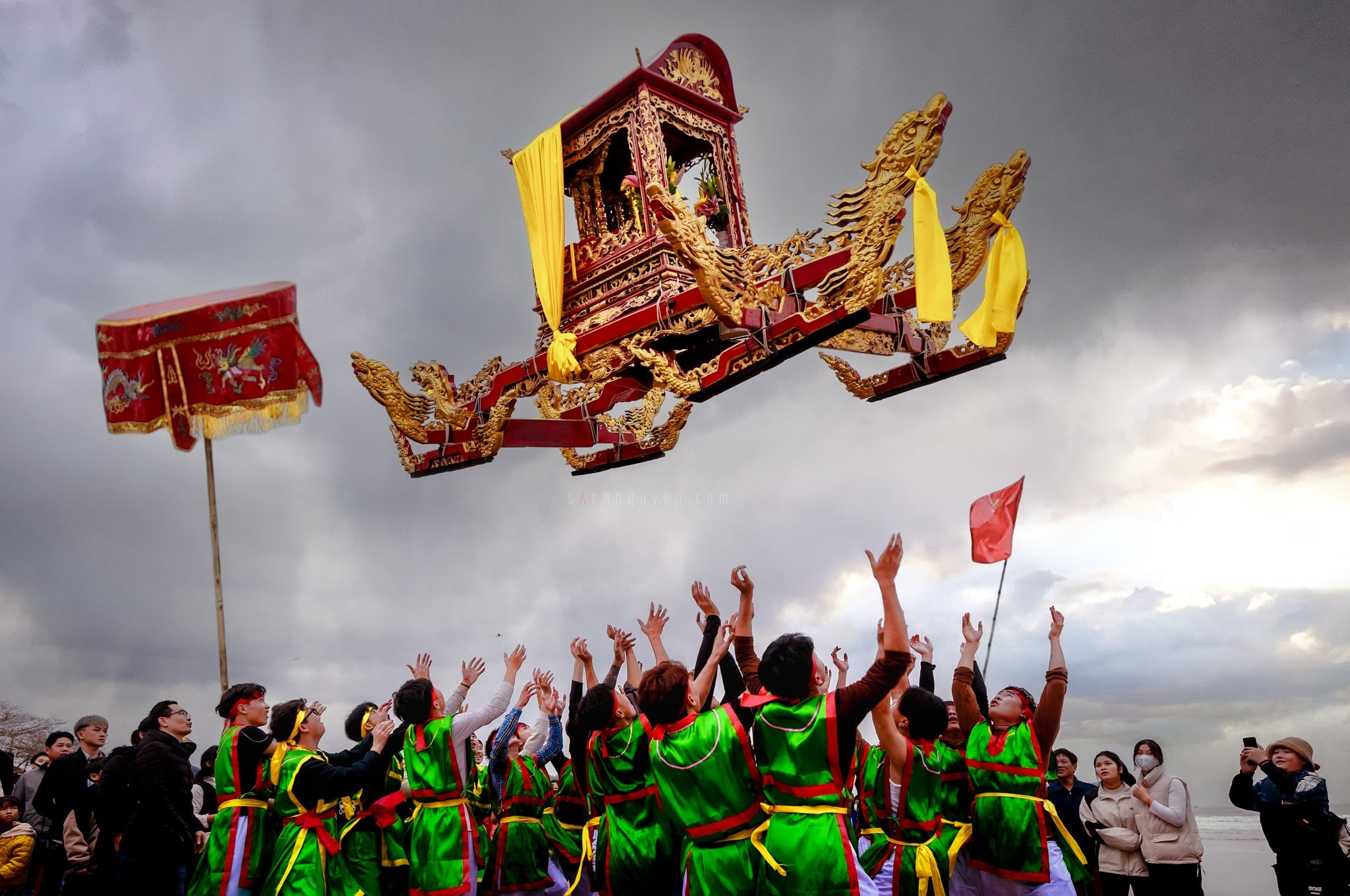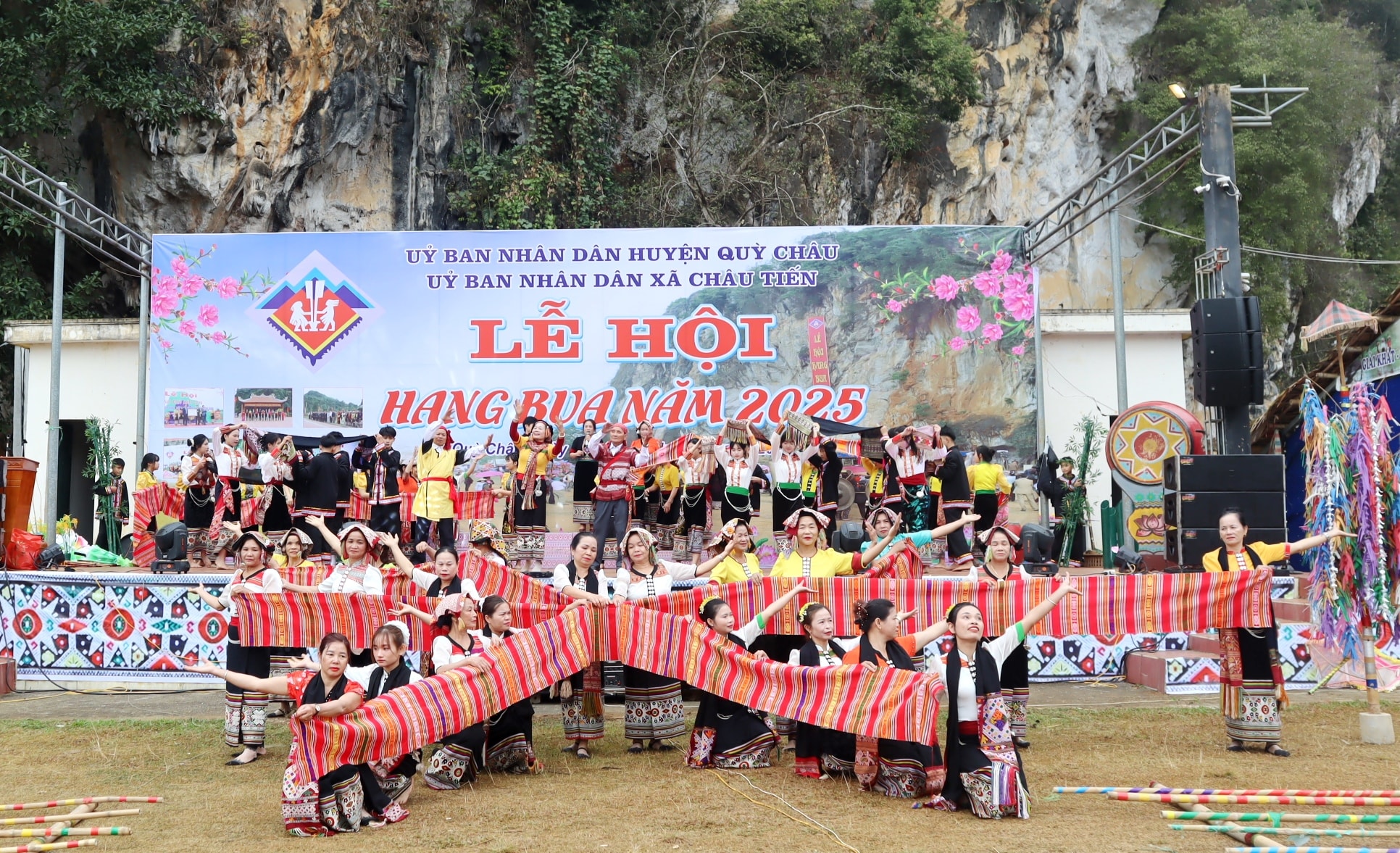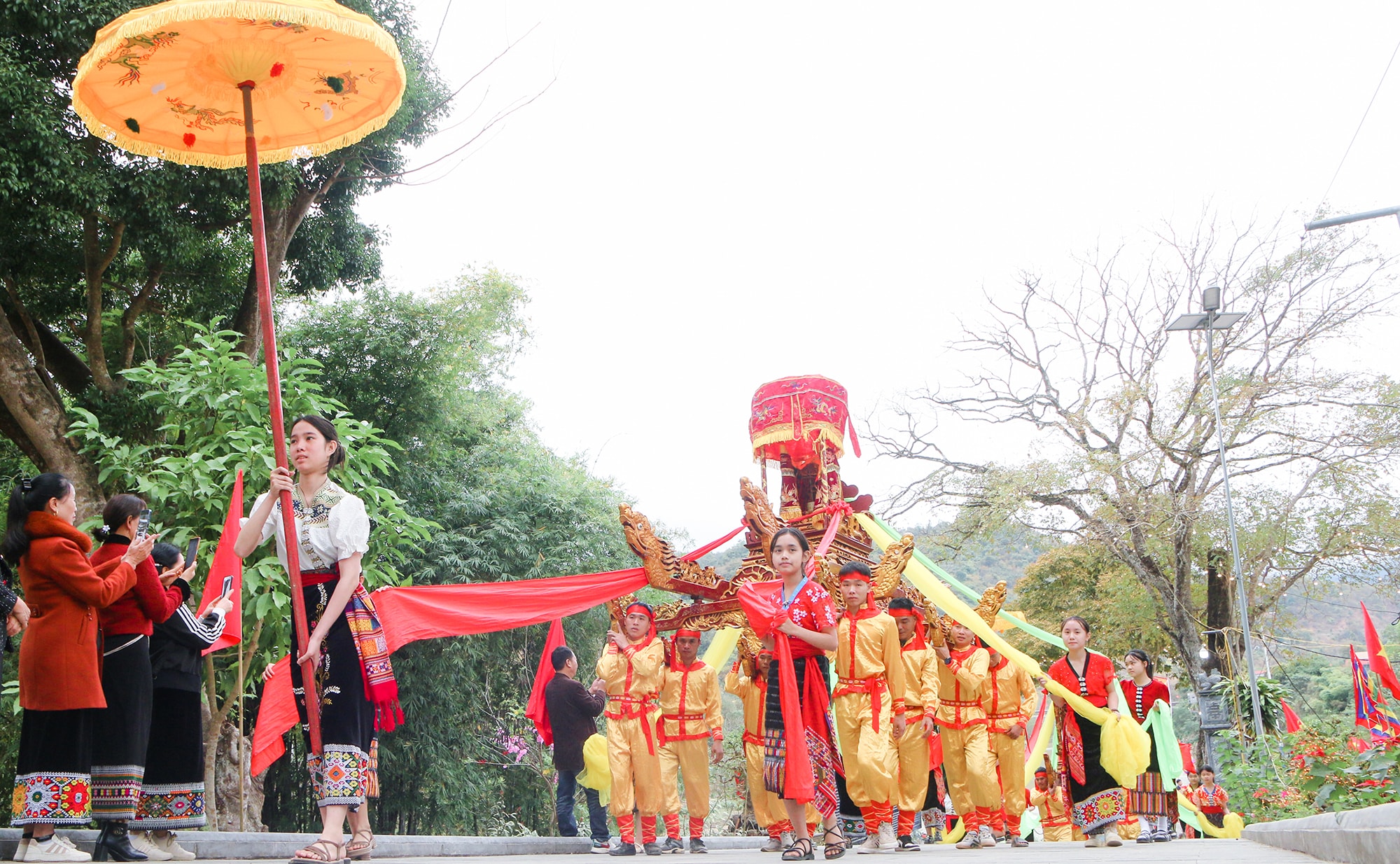Promoting regional cultural values through festivals.
To ensure that the festival showcases the cultural identity of the region, the Department of Culture and Sports and many localities have provided guidance on building and developing unique cultural tourism products that are rich in local character and attractive to tourists from within and outside the province.
The festival is deeply sacred.
King Mai Temple FestivalThis is a traditional festival deeply rooted in national cultural identity, held annually to commemorate the heroic spirit of the Hoan Chau Uprising, which defeated the northern invaders and established the independent Van An Kingdom in the early 8th century. Every year, from the 12th to the 15th of January, the King Mai Temple Festival is solemnly celebrated, attracting tens of thousands of people.
According to Mr. Vuong Hong Thai, Vice Chairman of the People's Committee of Nam Dan district, in addition to the solemn ceremony, visitors can also immerse themselves in a lively atmosphere rich in national character through folk games such as traditional boat racing, wrestling, and chess.
The King Mai Festival is a major festival for the people in the region. Every year, the district issues detailed directives on the conduct of the rituals and festivities, ensuring that all activities maintain their sacredness and rich cultural character.
Mr. Vuong Hong Thai - Vice Chairman of the People's Committee of Nam Dan District

People from all over the South Thanh Hoa - North Nghe An region are excited to return to the Cờn Temple Festival, one of the most distinctive spring festivals in Nghe An province. The Cờn Temple Festival is large-scale, long-standing, and rich in cultural identity. Since its restoration, the festival has been held many times with unique traditional rituals such as: the betel nut offering ceremony, the buffalo offering ceremony, the cake offering ceremony, the procession of the Saint to the temple for thanksgiving, the grand ceremony, and especially the origin ceremony associated with legends about the "Tran Anh Tong dream" or the "legend of the sacred log". Because of its profound historical and spiritual values, the Cờn Temple Festival has been recognized as a National Intangible Cultural Heritage.

The unique aspect of this festival lies not only in the ceremonial part but also in the celebratory part, which is the "Running of the Vomiting" tradition. This tradition has been intertwined with the spiritual life of the local people for hundreds of years. This year, the "Running of the Vomiting" took place after the fishing prayer ceremony on the morning of February 18th. Four palanquins, each carried by 20 strong young men from the coastal village of Quynh Phuong, were tossed into the air while running at full speed, accompanied by the resounding sounds of gongs and drums and the cheers of tens of thousands of visitors.
The "Running and Throwing" ritual is a unique ceremony deeply rooted in the spiritual and cultural identity of the Cờn Temple Festival. The procession and throwing of the palanquin during the "Running and Throwing" ceremony reenacts the legend of the villagers of Phương Cần descending to Phú Lương village to steal a sacred log. This act carries spiritual significance, as the sacred log symbolizes good fortune.
Ms. Dang Phuong Lan - Head of the Department of Building a Cultural Lifestyle & Family, Department of Culture & Sports

Besides the two distinctive festivals held in the plains and coastal areas, the festivals in the highlands of Nghe An also preserve the sacredness and rich cultural identity of the region. These include the Muong Ham festival in Chau Cuong commune, Quy Hop district; the Hang Bua festival in Quy Chau district; and the Van Cua Rao Temple festival in Tuong Duong... These festivals commemorate the deities who founded villages and taught the local people how to cultivate crops and build a prosperous life.
A distinctive feature of the highland festivals in Nghe An is the offering to the village guardian deity, a collective effort by people from all the villages and hamlets. These offerings consist of local produce cultivated and raised by the villagers. The festivities in these highland festivals still retain traditional folk games such as throwing the "con" (a type of ball), stick pushing, and bamboo pole dancing… attracting not only people from all nine villages and ten hamlets but also tourists from near and far, creating a vibrant cultural tapestry rich in ethnic identity.

Promoting the value of heritage
Nghe An currently has 26 festivals, including 19 spring festivals taking place from February 2nd to April 1st. These festivals attract a large number of tourists and are meticulously prepared at the district and commune levels.
Ms. Dang Phuong Lan, Head of the Department of Building a Cultural and Family Lifestyle, Department of Culture and Sports, said: "Since the end of December 2024, we have advised the Provincial People's Committee to issue Document No. 11848/UBND-VX on strengthening the management and organization of festivals in 2025. The document clearly states: The People's Committees of districts, cities, and towns should actively promote historical and cultural relics and the origins of festivals associated with the culture and people of Nghe An." Focus on implementing support measures for the restoration and protection of traditional festivals, linked with the organization of cultural and sports activities, in order to maintain unique and typical cultural values, meeting the spiritual needs of the people, especially traditional festivals that have been inscribed on the national list of intangible cultural heritage such as the Nine-Room Temple Festival, the Ong Hoang Muoi Festival, the Bach Ma Temple Festival, the Thanh Liet Temple Festival, the Qua Son Temple Festival, the Yen Luong Temple Festival, the Nguyen Canh Hoan Temple Festival...
According to Ms. Dang Phuong Lan, festivals with many distinctive cultural elements, such as the Thanh Liet Temple Festival and the Corn Temple Festival, need guidance and management methods in their organization to avoid safety and order issues, such as overcrowding and security breaches. In addition, besides the characteristic rituals that promote cultural values, there should also be modern elements in the festivities. Examples include sports like volleyball, traditional costume contests, and artistic programs that suit the tastes of locals and tourists.
"Previously, many people thought that introducing modern games into festivals would lead to a loss of cultural identity, but over time, organizations have found suitable ways to organize them, seamlessly conveying values that are both entertaining and celebrate the beauty and goodness of contemporary life. I believe that these vibrant festival activities also contribute to creating a unique identity for each locality," said Ms. Phuong Lan.
Speaking about preserving and promoting cultural values through festival activities, Mr. Bui Cong Vinh - Deputy Director of the Department of Culture and Sports, said: Currently, most festivals are trending towards innovation. They are no longer limited to traditional forms, but are expanding with many supporting activities such as exhibitions, food fairs, and cultural exchanges…
Many festivals have taken the initiative to apply modern technology such as LED lights and high-tech sound systems to revitalize the festival space. Innovation is necessary to keep up with the times, but if not balanced, it can cause festivals to lose their traditional identity. Therefore, the most important thing is how to ensure that festivals meet the criteria of attracting tourists while still preserving the unique characteristics and identity of each locality and region.
Mr. Bui Cong Vinh - Deputy Director of the Department of Culture and Sports



